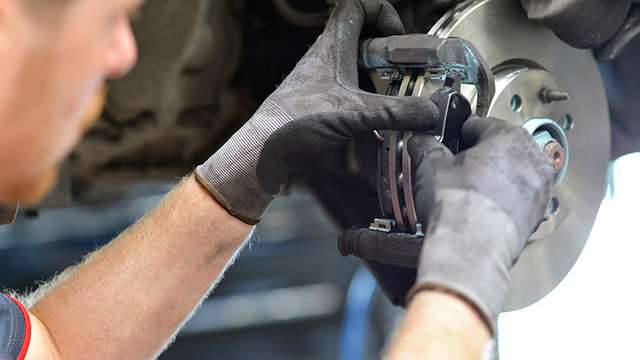- brakes
Everything you need to know about brake pads

Updated 9 Oct 2019
Michael Jacobson

Did you hear about the car that went over a cliff? Them’s the brakes.
Apologies for the lousy joke, but at least it confirms that brakes are no laughing matter.
In fact, they sit at the top of your car's most important features and keeping them in tip-top condition should be a no-brainer.
When you press your foot on the brake pedal, the ensuing process is a bit like that old song about "the kneebone's connected to the thighbone, the thighbone's connected to the hip bone", except this time the connections unite foot, pedal, fluid, pads, calipers, shoes and discs/rotors.
The question is: how can you tell when your brakes need inspecting, repairing or replacement?
How do I know when my brake pads need changing?
With the exception of Rolling Stones guitarist Keith Richards, age and wear have a detrimental effect on everything – brakes included.
While brake pads become a teensy bit thinner every time you press the brake pedal, the good news is that brakes are adept at letting you know if anything's amiss.
Clues include:
- Taking longer to decelerate or stop;
- A change in the feel of the brake pedal or a vibrating/shuddering through the pedal and/or the steering wheel;
- If, like Fred Flintstone, you're pushing the brake pedal through the floor and scraping your feet on the tarmac to slow down, get your brakes checked;
- Wheel lock-up, skidding or veering to one side when braking;
- Brake or ABS warning lights;
- Noises you wouldn't hear on any new car TV commercial, such as grinding, screeching, growling, groaning and squealing.
How long will my brake pads last?
Sources researched for this article estimated between 30,000 and 70,000 kilometres, depending on driving conditions and driver behaviour.
If the majority of your driving is in city traffic, you'll be on the brakes more often than someone cruising Australia's highways and that usage will tell.
Furthermore, some drivers ride the brakes, some hit the anchors every couple of seconds, some brake too hard and some not hard enough – each affects the life of the brake pads.
How do I check my brake pads?
If you have a hoist handy at home, whack the car on it, hit the green button and make your observations from there. A jack will do the trick too.
Otherwise you'll have to get low down to get the lowdown.
The brake pad should be visible through the wheel and if the brake lining is down to the thickness of the steel backing plate, it's inspection and replacement time.
Pedal to the metal
Those nasty sounds mentioned earlier could mean more than just worn brake pads.
If the brake calipers and brake discs are coming into contact, this heavy metal friction can carry even nastier ramifications for your overall brake system and, inevitably, your wallet via machining or total replacement.
Can I change the brakes myself?
Sure, if you're a qualified mechanic or even a gifted amateur.
And who knows, sometimes the process might be a simple case of changing old parts for new.
However, if other issues are in play beyond mere removal and replacement, complications can set in quickly and lead to trouble down the road, literally.
How much will it cost to get new brake pads?
All of which leads to cost. As this article on AutoGuru states, brake prices vary between makes and models.
For brake pad and disc rotor replacement on an average car, costs start around $300-$350 and can rise to $600+, depending on the required work.
Prices climb higher with the relative standard of car and brake system.
At AutoGuru, we put you in touch with experts who offer both mechanical surety and peace of mind.
The important thing to remember is that a sound braking system means a safer drive for you and yours.
Because when it comes to stopping, good brakes are all the go.

Written By
Michael Jacobson
Michael Jacobson is an award-winning Queensland-based writer.
His appreciation for motoring began as a young journalist covering racing from Simmons Plains in Tasmania.
Over the years he has interviewed many Australian and international motoring greats.
He has also been driven around Lakeside Raceway at ferocious speed, circumnavigated the Gold Coast Indy circuit at more than 200kmh and managed to squeeze 365,000 kilometres out of a Toyota Starlet.